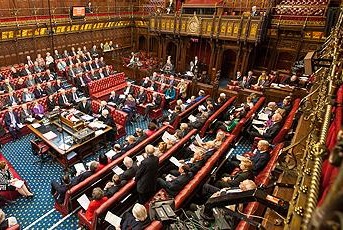Statement of changes to the Immigration Rules criticised for imprecise terms and lack of supporting documentation
The House of Lords Secondary Legislation Scrutiny Committee last week expressed concerns over changes to the asylum process made by December's statement of changes to the Immigration Rules (HC 1043), which took effect on 31 December when the Brexit transition period ended.
 Image credit: UK GovernmentThe concerns are raised in the Committee's 40th report of the 2019-2021 session, available here. The first three pages of the report cover HC 1043.
Image credit: UK GovernmentThe concerns are raised in the Committee's 40th report of the 2019-2021 session, available here. The first three pages of the report cover HC 1043.
In the report, the Committee notes that the principal function of the changes made by HC 1043 is to clarify the places and circumstances in which an asylum application may be properly made and enhance the UK's capacity to treat as inadmissible claims made by those who have passed through a safe third country.
The Committee expressed concern that the explanatory memorandum accompanying the statement of changes had not provided sufficient information about the policy's objectives and effective implementation.
In addition, the Secondary Legislation Scrutiny Committee criticised the "imprecise terms" used in the changes, such as "a reasonable period of time".
The Committee also criticised as 'poor practice' the fact that the Home Office has not published new enforcement guidance until 31 December 2020 at 11pm, when the existing guidance ceased operation.
"Subsequent checks after 1 January found pages that said - unhelpfully: 'The Brexit transition period has ended and new rules on claiming asylum in the UK now apply. This page is currently out of date.' This is equally poor practice," the Committee added.
Due to the lack of clarity, the Committee asked the Home Office for more specific details about how the Rules changes would operate. The report features a number of quotes from the Home Office explaining the purpose and operation of the changes.
The Home Office told the Secondary Legislation Scrutiny Committee: "The policy objective is to operate a deterrent against migrants choosing to pay large sums of money to people smugglers and criminal facilitators, and undergo dangerous journeys across Europe and across the Channel … The system is intended to discourage secondary movements within Europe once a migrant has reached safety — including those dangerous journeys across the Channel."
When asked for more specific details about how the changes would operate, the Home Office explained it would vary on a case by case basis, saying: "When an individual makes an asylum claim, we will gather any evidence, verbal or documentary, of claimants having spent time in or having connections to a safe country. This could include biometric evidence, passports, legal papers, employment papers, bank statements, invoices, receipts and other similar documents (this list is not exhaustive). An account of the individual's immigration history will be taken as part of their asylum screening interview to fully understand the chronology and detail of how the person came to the UK. Evidence of a person's method and place of entry to the UK and their known or probable place of embarkation by Home Office officials or another person in an official capacity will be taken into consideration."
In response to a question by the Committee on what would happen to asylum seekers deemed inadmissible, the Home Office said: "A person will be regarded as an asylum seeker up to the point of being deemed, formally, to be inadmissible. At that point they would be a failed asylum seeker. Both asylum seekers and failed asylum seekers can access support to prevent against destitution (in accordance with our obligations under the ECHR.) Our powers to detain are linked closely to an ability to remove within a reasonable period of time. If that is possible, therefore, detention is an option. If not, we are looking at different accommodation models for our asylum intake generally."
If no third country was willing to take the failed asylum seeker, the Home Office explained: "If returns are not, ultimately, possible within a matter of months, a person will be admitted into the asylum system."
In conclusion, the Lords Secondary Legislation Scrutiny Committee stated in its report: "These changes in the Rules may alter an individual's status to failed asylum seeker more quickly or perhaps limit their ability to have the decision reviewed, but it is not obvious how, in the absence of a clear enforcement policy, it will deter secondary movements. The House may therefore wish to ask the Minister for details of how the 'robust returns' policy is to be delivered and the deterrent effect promulgated."
It should be noted that this is the second time in recent months that the Secondary Legislation Scrutiny Committee has raised concerns over a statement of changes to the Immigration Rules. As we reported on EIN in November, the Committee found that October's very lengthy statement of changes to the Immigration Rules (HC 813) made parliamentary scrutiny "virtually impossible", as it was "wholly unjustified" of the Government to combine so many policy areas in a single statement.